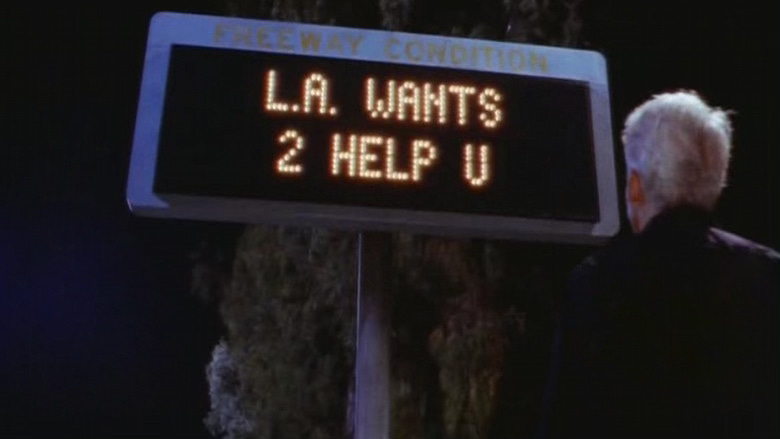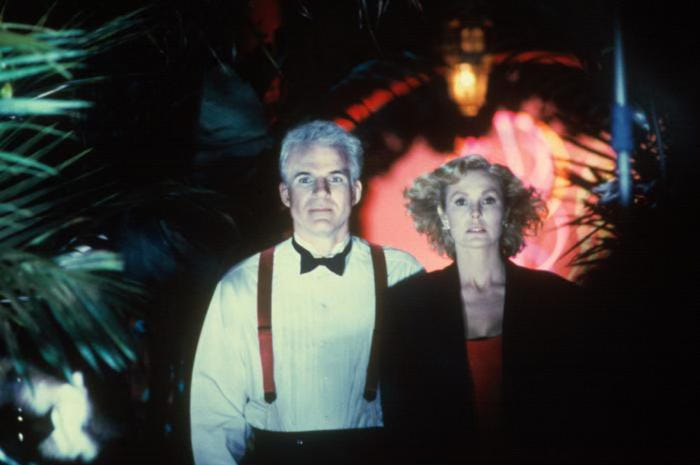What's the Story, L.A.?
Steve Martin's surreal love letter to Los Angeles, a city as baffling as it is beguiling
Editor's note: Geoff Wolinetz returns to Cognitive Frames after his sharp analysis of Albert Brooks's Defending Your Life. This time, he tackles Steve Martin's L.A. Story—a film that treats Los Angeles as both setting and character, using Shakespearean themes to explore how we perform ourselves into existence.
As someone five years into his own L.A. journey, Geoff writes from a perfect vantage point: close enough to feel the city's rhythms, distant enough to see its absurdities. The result is criticism that does what the film itself does—finds meaning in the space between illusion and reality. – D.H.
Full disclosure: I live in Los Angeles.
I haven't lived here long - just 5 years - but I do live here. When I lived in New York, I would gripe and complain - about the subways always being late, about the streets being crowded with tourists, about my rent being too high1. But when someone else did - someone who didn't live there - I'd get angry and defensive. Hey, I can complain about New York, but you can't! You're not from here. There's a certain right - a privilege - that comes with being a native.
Steve Martin is not technically a native of Los Angeles, but L.A. Story cements him as the quintessential Angeleno - it's a love letter to a city that makes itself so hard to love, filtered through a lens of Shakespearean magic and modern absurdity. That filter pushes at the central theme of the entire film, one that resonates through identity, through love and through the city itself - illusion vs. reality. In a city where the lines between performance and authenticity are constantly blurred - can you ever truly find yourself or will you always be playing a role?
And it's through the lens of Shakespearean whimsy, the film becomes more than a romantic comedy. It transforms into a modern-day Midsummer Night's Dream, where freeway signs whisper advice and love is as unpredictable as LA weather2. Like Shakespeare's enchanted forest, Los Angeles is both setting and character, a magical landscape where the absurd feels perfectly plausible.
And that sign! We should all have someone in our lives like the freeway sign in this film: sage, direct, funny and irreverent at all the right times. Like Puck or even Horatio, whom the film quotes at its end, the freeway sign is not just the perfect combination of form and function for the plot of the film, it's a perfect foil to Harris as he navigates the emotion and cracks in the facade of his reality that have come on. The freeway sign is Harris's guide, his conscience, and his reminder that even in a city built on illusions, moments of truth still flash by if you know where to look.
The freeway sign can offer advice, but it can't make choices for Harris. Like many Angelenos, he's left to navigate a world where performance often replaces authenticity, and where finding the truth about love, about ambition, about himself requires pulling back the curtain on his own carefully constructed illusion. Harris's life is a careful performance: quirky enough to seem interesting, safe enough to avoid real risk. It's only when his relationship cracks and his routine begins to falter that Harris is forced to confront the uncomfortable question underneath it all: which parts of his life are real and which are part of the veneer?
Illusion and Image in LA Culture
Los Angeles is a city built on illusion, not just movie magic but personal branding as a way of life. L.A. Story doesn't just point this out, it roasts it with love. Take the scene with the group lunch3, where the table fires off increasingly ridiculous drink orders both as a one-upsmanship tactic and also without even thinking twice: "half double decaffeinated half-caf, with a twist of lemon," then the rest of the table adding a twist of lemon because you've got to have a twist of lemon. The gravest thing you can be seen as in LA is out of touch or passé.
In this version of LA, your beverage order is your personality, and the more complicated it is, the more you must have your life together. It's hilarious, but also quietly brutal: identity becomes performance, and performance becomes currency. Who you are is less important than how impressively you can describe it out loud.
That same logic plays out in places like L'Idiot - the film's absurdly exclusive, hilariously named restaurant4, where getting a table is treated like some amalgam of corporate M&A and a religious experience. The hostess acts like a gatekeeper to Nirvana, and patrons treat proximity to truffle foam like social capital. Even basic human behavior gets folded into the spectacle: the restaurant hands out flavored dental floss between courses and people casually floss their teeth in public, as if oral hygiene at the dinner table is some kind of weird status flex. In L.A., not even self-maintenance is private; it's performance. It's a curated version of self as a stand-in for depth.
"When I'm around you, I find myself showing off, which is the idiot's version of being interesting."
Harris nails it with one of the film's most cutting lines: "When I'm around you, I find myself showing off, which is the idiot's version of being interesting." In that moment, this self-referential comment is a punchline, yes, but also a mirror to the world he inhabits. Because the grand underlying joke of L.A. Story is that everyone is showing off - loudly, weirdly, and with the best possible lighting.
Cracks in the Facade
L.A. in the early 1990s, like many large cities, was in many ways a different place than it is today. Edgier, more dangerous, sharper. One of the film's most striking satirical moments arrives during a freeway shootout, which isn't staged as a dramatic set piece, but presented as a very routine part of everyday life. Bullets fly. Chaos erupts. It's so routine that even an elderly couple is involved.
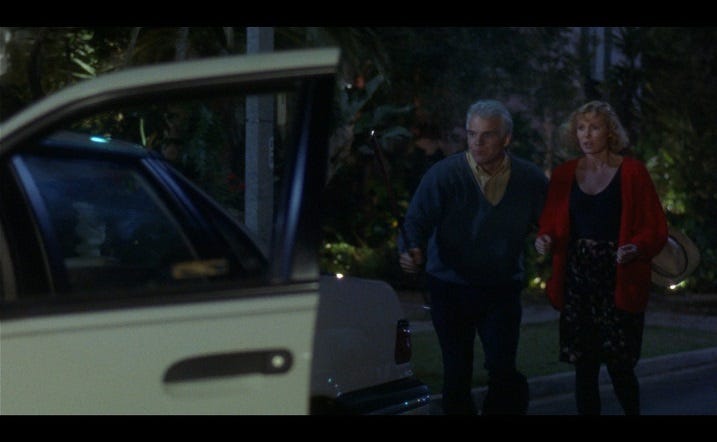
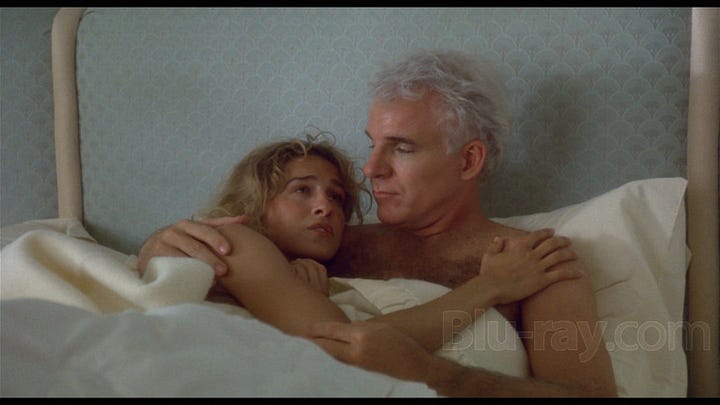
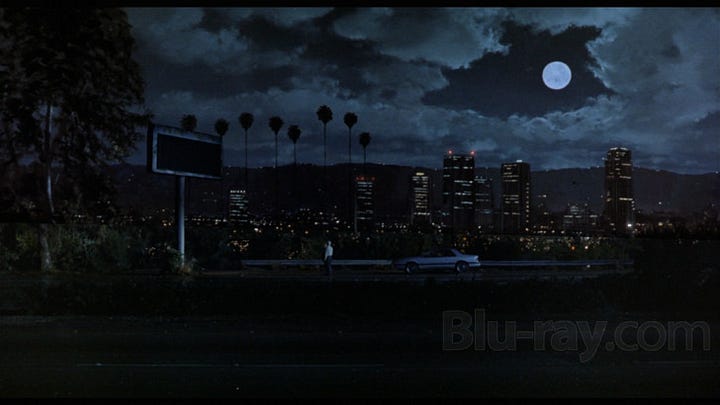
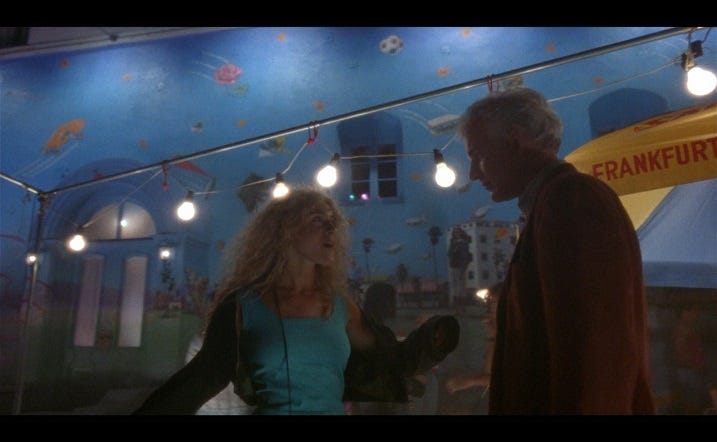
And yet, the surrounding characters treat it with a kind of detached bemusement, as though it's no more disruptive than a traffic jam or a Jamba Juice order gone wrong5. In fact, the most stressful part for them isn't the shootout itself - it's Harris's girlfriend's inability to get his gun out of the glove compartment and loaded efficiently enough. It's ridiculous but it's also an incisive critique of a city that, at the time, was grappling with real violence, rising crime, and deep social unrest. Just like the tiniest details peppered throughout this movie, even this is meant to capture how normalized the extreme can become in a place so steeped in image and illusion. The violence is part of the background noise, both literally and metaphorically, because Los Angeles can feel like just another part of the show even in crisis.
Reality Through Love: Finding Truth in the Surreal
But beneath all this absurdity, the film starts to peel back something more vulnerable. For all of Harris's charm and wit, over the course of the film we begin to see how much of his identity is curated. His own carefully maintained performance stitched together by cleverness and convenience. In many ways, Los Angeles rewards that kind of performance, even demands it. But as Harris stumbles through romantic misfires and supernatural interventions, something cracks. The world around him, so polished and so performative, begins to feel hollow.
And that's the deeper truth the film is quietly working toward all while making you laugh: that love, connection, and meaning - the things Harris claims to want - require more than a good script and an agent to sell it. They demand presence. Vulnerability. They have to have something at stake. It's in the moments where Harris drops the act that we begin to see the faintest outline of something real. In a city that teaches people to edit themselves into perfection, through facelifts and BBLs6 and exaggerated resumes and perfect headshots, L.A. Story reminds us that perfection is the enemy of true intimacy.
Harris K. Telemacher's emotional arc is the quiet engine of L.A. Story. At the outset, he floats through life buoyed by charm, absurdity, and a kind of curated detachment - almost dissociated. His relationships, much like the city he lives in, are all about the surface. That's especially true of his affair with SanDeE7, a relationship built on manic energy and mutual self-interest. She's all flash: fashionable, fast-talking, and famously shallow. And yet, for a time, Harris convinces himself that this is what connection looks like. It's L.A. love, filtered through irony and image.
But then there's Sara.
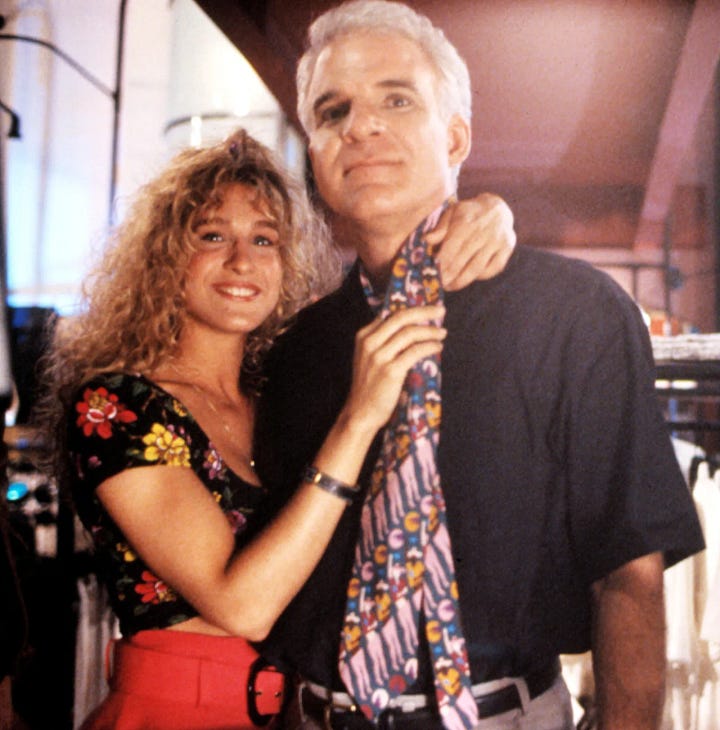
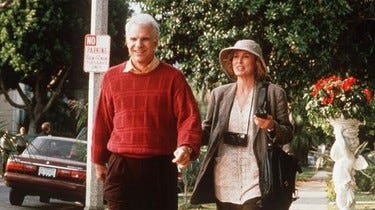
Sara is everything SanDeE isn't: grounded, skeptical, resistant to Harris's one-liners and self-mythologizing, even if she feels the same immediate physical attraction that he does. Where SanDeE reflects the illusion of Los Angeles back at Harris, Sara refuses it. She instead becomes a mirror in which he can actually see himself. Their relationship isn't smooth or immediate. Harris vacillates between the two women, between comfort and risk, between the illusion he's used to and the authenticity he claims to want. That tension becomes the heart of his transformation. Because loving Sara demands more than cleverness. It demands vulnerability. And letting the performance drop is terrifying to Harris.
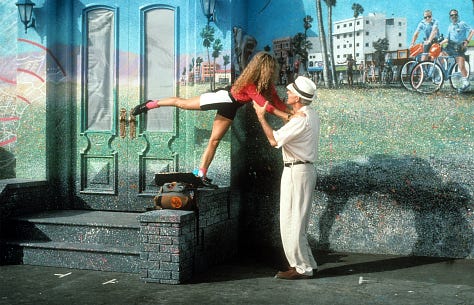
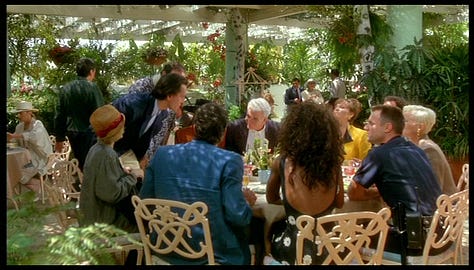
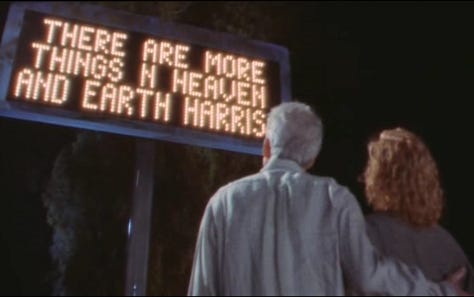
That's where the film's magic literally steps in. The city itself seems to rise up around Harris to push him toward the truth with which he's struggling. A freeway sign begins giving him advice. Coincidences pile up like fate trying to break through the noise. Even the weather - famously predictable in Los Angeles8 starts to behave unpredictably, like Shakespearean stage direction. These elements aren't just whimsical touches; they function like the enchanted forest in A Midsummer Night's Dream or the ghosts in Hamlet: surreal interventions meant to disrupt the order of things just long enough for characters to gain clarity.
In a lesser film, this would all build to a message about tearing down the illusion, escaping the city, choosing "reality" over artifice. But L.A. Story doesn't take that easy out. Instead, it suggests something subtler and more honest. Reality, it argues, doesn't require us to abandon the illusion entirely. We just need to see it clearly, name it for what it is, and decide what matters within it. Illusion is part of the structure. But so is intention. So is love.
"In a city built on storytelling, perhaps that's the real story: not whether what we're living is real, but whether we're choosing it with our eyes open."
In the end, Harris doesn't escape the performance of Los Angeles. He learns to live his truth within it. And in a city built on storytelling, perhaps that's the real story: not whether what we're living is real, but whether we're choosing it with our eyes open.
Ultimately, if the central framework of the movie is using Shakespeare not just as homage or adaptation, but as a useful tool to navigate the contradictions of Los Angeles, then there's one central question worth asking: In a city built on illusion and facade, can love still be real? L.A. Story's pretty definitive answer is yes—but only if you stop performing and start feeling. The film's great triumph is that it functions as both satire and a sincere tribute to the city that it so accurately represents. In Los Angeles, absurdity and beauty co-exist and Shakespearean truths still echo through freeway signs and half double decaffeinated half-cafs … with a twist of lemon.
Where to Watch: Available to rent or purchase on Prime Video, Apple TV, Vudu/Fandango at Home, and Microsoft Store.
Lionsgate issued a Bluray for the film’s 30th anniversary
Not currently included with any major streaming subscriptions.
The thing that I complain about most living in L.A. is that you cannot find a decent bacon, egg and cheese on a roll
It's absolutely pitch perfect that a giant thunderstorm grounds all the planes at the end of the film allowing Harris to reunite with Sara, because it never rains here, until it does. And when it does, it pours - shout out to Albert Hammond
When Harris engagingly asks "Oh you took a class in the art of conversation?" and the woman pauses and responds "Yes" with barely a change in facial expression and no further comment, I probably laughed for 10 minutes the first time that I saw it.
I'm legitimately embarrassed to say that, even in spite of seeing the restaurant's name written out in the movie, it took me at least 5 viewings to get that they were winking at the word "idiot" even if they were pronouncing it "ee-dee-oh" with a French affect.
Speaking of weird flexes, I had a conversation with Damon Wayans at a Jamba Juice in Beverly Hills
That's Brazilian Butt Lift for the uninitiated
Listening to her spell her name in the movie almost gave me a seizure
There's a very funny scene where station owner Woody Harrelson's boat sinks because he followed the advice of Harris's obviously bullshit weather report




